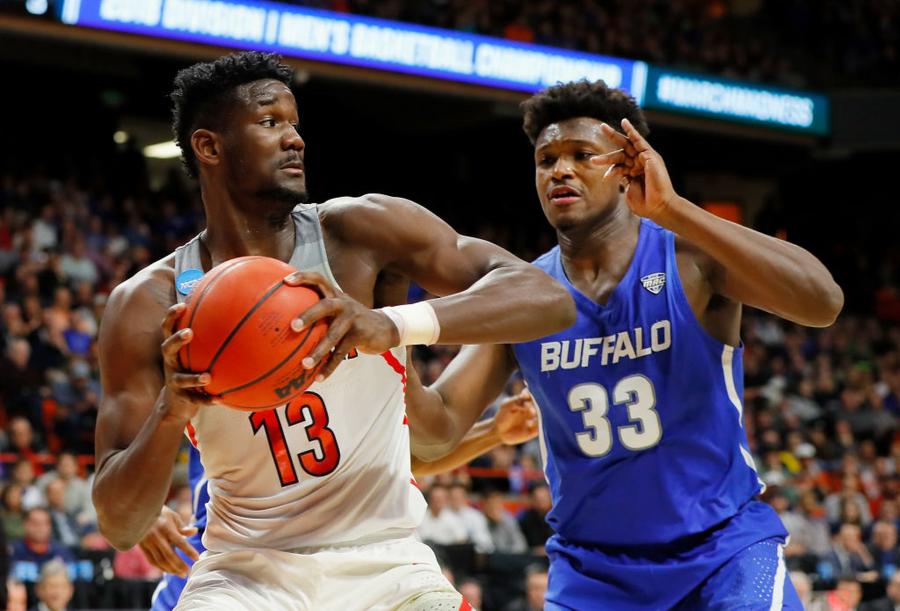The NBA Draft is an exciting time for everyone involved. There's hope everywhere. Fans celebrate their next potential franchise savior. Teams welcome the (hopefully) missing pieces to their playoff successes. And the players get to embark on their dream – playing in the NBA. And boy, does that dream come with a nice little monetary bonus attached to it.
The league uses a sliding scale for incoming rookies. This scale changes annually, and isn't an exact reflection of how much a rookie will make. Teams can pay a player anywhere from 80 to 120 percent of the player's salary at their draft spot. But one constant remains: it pays to be a No. 1 pick.
Whether it's DeAndre Ayton, Luka Doncic, or another player, the No. 1 selection this year will make about $6.8 million. If the Suns opt to pay 120 percent of the rookie scale, that salary goes up to nearly $8.18 million.
And that's just for the 2018-19 season. For a No. 1 pick, the scale is about $7.98 million in year two and $8.36 million in the third year, which is a team option. The fourth year is also a team option worth 26.1 percent more than the third year. Then the team can extend a qualifying offer worth 30 percent more than year four.
All that math is no fun, so we did it for you: the No. 1 selection in the draft could potentially make a little more than $40.43 million over four years, or about $56.88 million.
***Update as the Draft is happening***
DeAndre Ayton was just selected as the #1 pick by the Phoenix Suns. If he manages to make it to a fourth year with the Suns, he will be the first rookie to make $40 million in four years. The first two years are fully guaranteed the second two years are not. For perspective, the #1 NFL draft player, Baker Mayfield, was given a four year $39 million contract that is fully guaranteed.

Kevin C. Cox/Getty Images
For comparison, last year's No. 1 pick Markelle Fultz made about $7.02 million this past year, which works out to about $500,000 per game since he only made 14 appearances during the regular season.
Assuming the Sixers extend his team options, Fultz will take home $37.4 million over four years. If the Sixers extend a qualifying offer, Fultz's salary will be around $53.4 million over five seasons.
All that is to say this year's No. 1 pick can make in the range of $3 to $3.5 million more than Fultz over his first four to five years in the league.
Contrast that with the final pick of the first round, No. 30. That spot's sliding scale starts at $1.35 million. Over four years, that player could earn just under $9.11 million. That's not even a quarter of what the No. 1 pick makes.
Interestingly enough, the salaries of later picks are more strongly tied to their performance. If the team exercises its option, the No. 30 pick gets a raise of 80.5 percent from year three to year four – or can sign a qualifying offer for 50 percent of his third-year salary.
In other words, a player selected with the 30th pick can receive a huge bonus at the end of his rookie deal. While the total overall is still less than what No. 1 is making, it's gotta feel good to make nearly double what you just took home the previous season.
While being No. 1 is obviously the cream of the crop, other rookies can still make a pretty sizable chunk of change.
The No. 2 selection's sliding scale starts at just under $6.10 million. Over four years, he can make almost $36.2 million, If he plays well enough for a qualifying offer, he can take home just shy of $51 million over five seasons.
No. 3's first year salary begins at $5.47 million. The No. 4 and No. 5 picks come in at $4.93 million and $4.47 million, respectively.
Where things really get crowded is the jump from No. 10 to No. 11. The fourth-year team option is a 27.5 percent increase over year three for the No. 10 pick, while the No. 11 pick gets a 32.7 percent increase over that same timeframe. The grand total over four years starts at about $14.7 million for the No. 10 pick and $14.2 million for the No. 11 pick. That's a lot closer than the gap between #1 and #2.
Going down the lottery, the fourth-year raise moves from 32.7 percent at No. 11 all the way to 48.1 percent at the No. 14 selection. Players taken in the second-half of the draft get much higher bonuses proportionate to their salaries.

ANDREJ ISAKOVIC/AFP/Getty Images
See below for a full look at how much each pick will earn next season.
- $6,813,200
- $6,095,800
- $5,474,200
- $4,935,600
- $4,469,400
- $4,059,400
- $3,705,700
- $3,394,800
- $3,120,700
- $2,964,500
- $2,816,300
- $2,675,700
- $2,541,800
- $2,414,800
- $2,293,900
- $2,179,300
- $2,070,300
- $1,966,800
- $1,878,200
- $1,803,000
- $1,730,800
- $1,661,700
- $1,595,400
- $1,531,500
- $1,470,200
- $1,421,600
- $1,380,500
- $1,372,000
- $1,362,000
- $1,352,100
/2019/06/GettyImages-1157236062.jpg)
/2017/06/GettyImages-699964284.jpg)
/2023/06/GettyImages-1500716240.jpg)
/2020/11/GettyImages-1201952123.jpg)
/2019/07/GettyImages-1157232596.jpg)
/2023/06/GettyImages-1470640710.jpg)
/2019/04/rr.jpg)
/2019/10/denzel-washington-1.jpg)
/2009/09/Cristiano-Ronaldo.jpg)
/2009/09/Brad-Pitt.jpg)
/2020/02/Angelina-Jolie.png)
/2009/09/Jennifer-Aniston.jpg)
:strip_exif()/2009/09/P-Diddy.jpg)
/2020/04/Megan-Fox.jpg)
/2018/03/GettyImages-821622848.jpg)
/2020/01/lopez3.jpg)
/2020/06/taylor.png)
/2009/11/George-Clooney.jpg)
/2019/11/GettyImages-1094653148.jpg)
:strip_exif()/2015/09/GettyImages-476575299.jpg)
/2017/02/GettyImages-528215436.jpg)